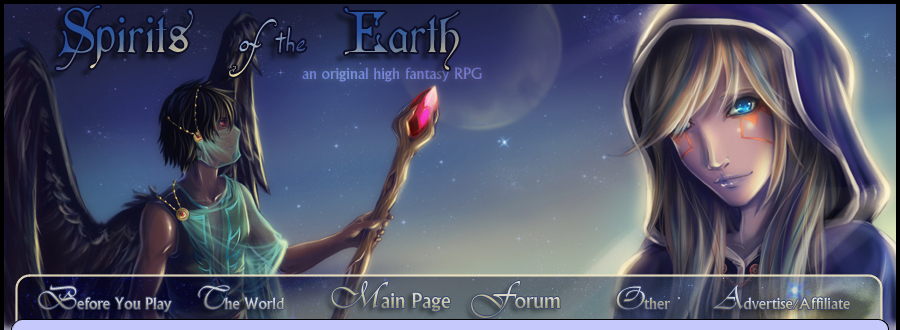

PARDON OUR MESS! Ketra, Adela's capital city, lies upon the great Ora River in the center of the kingdom and is considered to be a major trade hub. Most other cities are along the coast and the river, while numerous small towns and villages remain largely isolated due to the difficult terrain. Adelans come from a fractured, tribal background. They value community, strength, and tradition. 1. Race
Adelans are humans and tend to be tall and solidly built, with copper-dark skin and often very vibrantly colored eyes. Dark hair colors are most common, and reds are also often seen. Lighter skin and hair indicates more Serenian in their genes. Most magecraft is rare among Adelans, but beastspeaking (a psychic power allowing one to communicate telepathically with animals) is quite common, as are shamanic powers that draw upon nature's vitality. Among Adelans, far more women than men boast magical powers, and magic is generally considered a feminine pursuit. There is a lot of pride and patriotism in Adela, and a good deal of racial tension. They are proud of being "civilized" but "not Serenian", and attitudes and values can change depending on the location. Those Adelans living closer to Serendipity's border tend to be more "Serenian" in culture and looks, and may frown upon those who look too native or practice native traditions; in their view, it's ideal to have dark skin and hair, as that marks them as Not Serenian, but not too much. Meanwhile, those Adelans that live further from Serendipity tend to hold onto their old traditions and view city folk with more suspicion. There are even areas of Adela that remain relatively untouched by the Serenian conquest that maintain their original tribal culture. Despite the racial tension, the tribal roots from which the kingdom grew remain strong in the Adela of today and are apparent in the great value Adelans place on community, strength, and tradition. Adelans believe that words, symbols, and actions all have power, and it is through these acts that they honor spirits and maintain balance in life. Adelans have no organized religious service. Rather, their rituals are integrated into daily life—into their actions, clothes, the objects in their house, and the words they speak. Wrongs are righted in the same way, through these ritualized actions. It should be noted that there is a marked difference between worship and honor. Adelans do not worship their patron spirits, but instead pay them respect and honor. It is perfectly acceptable to bargain with spirits and ask them for things one wants. It would be, for instance, a typical action to tell an unresponsive fortune spirit that if it does not begin to bring wealth to your tribe, you will remove its shrine from your home and pay homage to a different spirit instead. Adelan spirituality and superstition is so engrained into their daily lives and culture that even those who claim to not believe in such silly "savage" nonsense still perform little rituals without even thinking about it. They might be careful not to tell a secret in front of their cat (out of the belief that cats will whisper your secrets into peoples' ears while they sleep), or they might turn in a circle three times if they hear an owl in the daytime (out of belief that hearing an owl in the daytime means someone close to you will die), but they are totally not superstitious! Most villages and tribes in Adela will have certain patron spirits, those whom they honor above all others and who are thought to aid that tribe exclusively. These tribal patrons are usually tied to the geographic area the village resides in—the forest that surrounds them for example, or a sheltering mountain, or an unusual feature like a large boulder or underground lake. This trend extends to individual homes, with people having spirits who they favor and who are thought to favor them in return. Even the largest cities and towns will have public shrines erected for residents to pay homage to a particularly powerful local spirit. Dragons hold a particular significance in the Adelan worldview. They are seen as keystones, creatures who's very existence holds the world in balance. Adelans have honored them since their pre-history, and continue to do so. Killing a dragon is a grievous sin against righteousness itself and a crime punishable by death. A market exists in Adela for dragon scales and teeth as good luck charms—purportedly shed naturally, but vendors willing to take the risk will buy from poachers. It was not a peaceful mingling of cultures. It was friendly in the beginning, with early Serenians bringing with them their knowledge of agriculture and architecture, until Serendipity decided to expand its border and take the land forcibly. Many of the original, peaceful tribes were erased, forced to assimilate into Serenian culture and abandon their "savage" traditions. Some of the fiercer tribes were able to put aside their own feuds and unite, resisting Serenian rule and holding onto their territories and cultures. Adela was fractured, a part of Serendipity but far from unified. From the never ending disputes emerged Ysaryk of Adela, who first conquered and unified the warring tribes and then demanded sovereignty from Serendipity. Faced with hostility from both the North in Connlaoth and the South in Adela, Serendipity withdrew all claim to the lands under Adela's control. Today, Adela is one nation, but it is still divided and tumultuous. |
